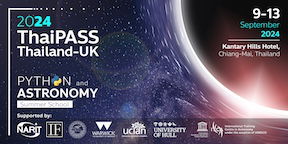Pre-ThaiPASS exercise
All participants are encouraged to try the Pre-ThaiPASS exercise sheet, available on the ThaiPASS'24 GitHub page.
Summary of activities
| Day | Theme | Lecturer |
|---|---|---|
| Mon 9th |
Exoplanets + Conference dinner |
Dimitris Stamatellos |
| Tue 10th | AGN & Time Domain Astronomy | Krittapas Chanchaiworawit |
| Wed 11th | Excursion day | |
| Thu 12th | Galaxies | Claire Cashmore |
| Fri 13th (half day) | Cosmology | Teeraparb Chantavat |
Questions can be submitted anonymously at vevox.com, session ID 192-191-437.
Slides and model solutions will be available on the ThaiPASS'24 GitHub page.
After the workshop, please complete the ThaiPASS'24 feedback form.
Detailed program
Monday schedule:
Registration from 08.30
09.15-09.30 Welcome and introduction (Siri Chongchitnan)
09.30-10.30 Exoplanets I (Dimitris Stamatellos)
10.30-10.45 Coffee break
10.45-12.15 Exoplanets II
12.15-13.30 Group photo and buffet lunch (Party Room)
13:30-15:00 Exoplanets III
15:00-15:20 Coffee break
15:20-17:00 Exoplanets IV
18:30 Conference dinner (at Party Room)
EXOPLANETS: SEARCHING FOR NEW WORLDS
Dimitris Stamatellos (University of Central Lancashire)
Abstract: We will introduce students to exoplanet detection methods and discuss planet formation theories. Topics include:
- Exoplanet detection methods (direct imaging, transits, radial velocities, microlensing)
- Properties of observed exoplanets
- Requirements for a planet to be habitable
- Planet-formation theories
- Recent results from the James Webb Space Telescope.
Students will work with exoplanet transit data from the Kepler Mission database. Students will plot transit curves and use them to determine whether a planet is in the habitable zone. Students will learn about the main exoplanet detection methods and basic planet formation theories. They will understand more deeply our quest for finding new exoplanets and traces of life outside our Solar System.
Tuesday: ACTIVE GALACTIC NUCLEI and the Ever-Changing Universe
Krittapas Chanchaiworawit (National Astronomy Research Institute of Thailand)
Abstract: The Universe is evolving at a much faster pace than we have previously thought. In this session, you will learn about basic properties of active galactic nuclei (AGN) as well as how time-domain monitoring of these intriguing objects can give us an insight into how supermassive black holes and their host galaxies co-evolve. The key Python activities include:
- Learning about AGN as cosmic probes for the assembly of large scale structure.
- Extracting physical and chemical parameters from AGN spectra.
- Classifying AGN with the traditional approach and with ML algorithms.
- Using time-domain data, auto- and cross-correlation functions to deduce the nature and structure of AGN accretion disks.
Thursday: EXPLORING GALAXIES WITH MACHINE LEARNING & AI
Claire Cashmore (University of Hull)
Abstract: We will explore galactic and extragalactic astronomy, from large-scale structure of the Universe down to small-scale physics that shape each galaxy. Vast amounts of data are being produced by observations and simulations, and manually analysing Big Data is becoming impossible without machine learning and AI - which will be explored here.
Topics include:
- Galaxies as cosmic building blocks
- Galaxy morphology and evolution
- Overview of machine learning techniques
We will use machine learning (e.g. convolutional neural networks) for galaxy classification. Students will compare real and simulated images of galaxies (e.g. from Illustris) and classify them by type. Students will learn about the physical processes responsible for producing different types of galaxies.
Friday: COSMOLOGY: Exploring the evolution of the Universe (half day)
Teeraparb Chantavat (Naresuan University)
Abstract: We will utilize interactive CLASS and GetDist code to investigate structure formation in the early universe and cosmic evolution. We will study:
- Structure formation
- The age of the universe
- The constraints on key cosmological parameters from real data.
We will use Bayesian statistics and Metropolis-Hastings algorithm to explore the multi-dimensional space of cosmological parameters. By the end of the session, students will be able to generate contour plots of joint constraints on key cosmological parameters.
Schedule for Tuesday and Thursday
09:00-10:00 Introductory lecture
10:00-10:15 Coffee break
10:15-12:00 Lecture/Python activities
12:00-13:30 Lunch (Party Room)
13:30-15:00 Lecture/Python activities
15:00-15:20 Coffee break
15:20-17:00 Python activities and wrap-up
Schedule for Friday
09:00-09:15 Briefing by Dr Saran Poshyachinda, Director of NARIT
09:15-10:30 Cosmology I (Teeraparb Chantavat)
10:30-10:45 Coffee break
10:45-12:00 Cosmology II
12:00-12:15 Feedback, prize-giving and wrap up.
12.15 Lunch and Departure.

